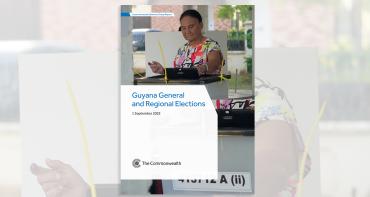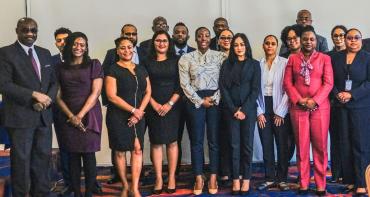Pakistan’s 2013 elections mark progress in terms of general framework, administrative arrangements and voter turnout, but high level of violence is a concern.

Key Findings
- Voters in Pakistan turned out in very large numbers on 11 May to cast their ballots and express their will to elect their Provincial and National representatives. This will lead to the transfer of power from one elected civilian government to another, which will be a key milestone for Pakistan. Based on the process up to this point the 2013 elections represent notable progress for Pakistan towards holding fully democratic elections.
- The positive features of the 2013 elections include: an improved legal framework; a higher level of confidence in the ECP at the national level; a significantly improved voter registration process; election day procedures which in most instances were well managed, with the notable exception of parts of Karachi; and, a very high turnout of the electorate to cast their votes.
- Of particular concern are: the level of violence in some parts of the country, which impacted on the democratic process; the handling of candidate nominations; the low level of women’s participation as voters and candidates, despite some improvements in this regard; and, the need to further improve mechanisms to ensure compliance with the campaign Code of Conduct.
- On election day Commonwealth observers reported that the ECP was generally well prepared for the polls in most areas and the process was well administered. But delays and other problems were experienced in some locations, with Karachi particularly affected. There was a very large security deployment in support of the process throughout, and this was generally effective and helpful. But there were reports of some localized disturbances and a number of violent incidents, including a number of fatal attacks, which are deeply regretted.
- Some polling stations struggled to deal with large numbers of assigned voters, particularly in places where the premises were too small for the task, but overall, faced with the high voter turnout, polling station officials worked diligently to administer the process and the new electoral roll proved to be reliable. In Karachi problems were also caused by the late delivery of materials, resulting in delays.
- Towards the end of polling the ECP extended the hours of polling but this was not adequately communicated down to polling station level, leading some inconsistencies in managing this. The count at polling stations was conducted in a transparent manner and polling agents were able to get a copy of the result at the completion of the count and the result was announced and posted. Such measures helped to provide transparency and accountability.
- The legal framework provides the basic conditions for credible, competitive elections and the 18th, 19th and 20th Constitutional Amendments and various electoral reforms have strengthened the framework for the elections. Significantly the 18th Amendment provides for increased independence of the ECP and a more inclusive process in the nomination of ECP members. This has increased the level of confidence in the election management body at the national level.
- There was a significant increase in the number of candidates and political parties contesting these elections compared to the previous General Elections. This is in spite of the short time period for candidate nominations and inconsistencies among Returning Officers (RO) in applying legal criteria in the confirmation of candidacies. It also appears that some ROs reportedly went beyond their remit of simply administering the process.
- The level of representation of women as candidates remains relatively low. For instance, while there are 60 reserved seats for women in the 342-seat National Assembly, women represented just over 3% of the total number of candidates contesting the general seats for the Assembly. The level of women as registered voters also remains relatively low and despite some improvements in the number of women on the voter register and some positive initiatives by the ECP there remains, according to ECP data, a shortfall of over 10 million women compared to men on the Electoral Rolls.
- This is not the first Pakistan election to be marred by violence and nor is Pakistan the only country where there is election-related violence. However, this election was affected by a significant level of violence, which impacted most dramatically in the city of Karachi and Balochistan and Khyber Pakhtunkhwa (KP) Provinces. While the violence in Karachi included inter-party violence, the bulk of the violence during the elections emanated from groups external to the elections. According to reports three candidates were killed in targeted attacks, well over a hundred party supporters killed and several hundreds injured.
- The violence was largely, though not exclusively, targeted against three political parties, seriously impeding their ability to openly campaign in many parts of the country and limiting their freedoms of movement and assembly. Affected parties were critical that more was not done to improve their security for the campaign and the integrity of the process in affected areas was compromised. The determination of parties to remain engaged in the process and ensure it was not derailed was commendable. The higher voter turnout recorded was thus in spite of threats of violence and reports of actual violence.
- The ECP issued a series of Codes of Conduct to help regulate the election campaign, media coverage, election observers and behavior of election officials. But despite the deployment of monitors, the ECP faced a challenge in ensuring enforcement of the campaign Code of Conduct.
- One of the ECP’s main successes was the much improved Electoral Rolls and universal suffrage is better provided for than previously, though the shortfall of registered women voters remains to be addressed. The use of NADRA’s database to create the Electoral Roll and the use of CNIC’s for the purpose of voter identification has created a far more reliable list of voters compared to previous elections. The ECP’s use of SMS to enable voters to verify their registration and identify their polling station was also an excellent innovation; despite coming under pressure on election day.
- It is important to note that the electoral process is yet to be completed and should there be any legal disputes they will have to be resolved using the prescribed channels and in a timely manner. We urge all parties and their supporters to be patient and calm as the process concludes. We will issue a Final Report at a later stage, containing our conclusions on the entire proces
The Electoral Framework and Election Administration
- Recent Constitutional amendments have strengthened the democratic dispensation in the country. Notably, the independence of the ECP at the national level has been strengthened by a series of reforms, including: a more inclusive and transparent method for nominating The Chief and other Commissioners; providing for full-time Commissioners; and extending the established term limits.
- It is significant that these are the first elections held under the full treaty obligations of the ICCPR, following Pakistan’s removal of its reservations in 2010. This has further helped to improve the overall legal framework for the polls and the democratic process in the country.
- In its Strategic Plan the ECP is committed to increasing the number of women employed in its full time staffing structure. Such an aspiration is to be commended but the current level of female employees, at just over 1%, is extremely low.
- The process for the nomination of candidates caused some controversy and is an area where the ECP struggled to assert administrative control and coherence. The existing regulations on candidate eligibility, as detailed in Articles 62 and 63 of the Constitution, contain a number of clauses which are highly subjective and in practice were interpreted and implemented differently by various Returning Officers. Further, as Returning Officers were drawn from the judiciary they were apparently not under the control of the election management body.
- The ECP deployed monitoring teams to report on violations of the Code of Conduct during the campaign but there was some criticism that there was not adequate enforcement of campaign violations, with a lack of clarity with regard to who was responsible for dealing with such complaints. Existing campaign regulations are highly detailed and it is not obvious what contribution to the process some of them, such as stipulating the permitted size of posters, make to the overall conduct of the elections.
The Election Campaign and Political Participation
The election campaign was characterized by a fairly active campaign, involving mass rallies by some parties, media advertising, extensive media reporting on the contest and widespread distribution of posters. However, the high level of insecurity and numerous attacks on candidates, party supporters and election offices cast a spectre over the process. Reporting on the number of casualties varies but it is clear that more than a hundred persons were killed and several hundreds injured in election-related violence, largely perpetrated by militants determined to undermine the process and with a particular emphasis to attack three political parties. This focus by militants against three parties in particular severely limited their election campaigns.
The current campaign spending limit for each candidate is currently just 1.5 million Rupees ($15,000), which is very low. The ECP had suggested increasing the amount as part of a reform package, thereby making the limits more realistic, but this was not adopted.
Voting and Counting Procedures
Commonwealth observers largely reported that poll officials processed voters according to the stated procedures. One of the main challenges was in cases where a large number of voters were assigned to a polling station, resulting in large crowds and increased pressure for poll officials and security forces. In Lahore observers reported that polling officials were struggling to deal with fairly large numbers of voters at some stations and there was a degree of confusion among some voters in identifying their designated polling station. Teams also noted that small-sized premises impacted on the quality of the process. Teams noted that contrary to the regulations campaign materials were often present in the vicinity of the polling stations; though Presiding Officers and police were often overwhelmed by more pressing tasks.
In Karachi NA-250, observers reported that poll officials were struggling to deal with a large voter turnout, partly due to a number of poll officials not turning up for duty and partly as polling materials had been delivered late, this led to some tensions in the constituency. There were other reports of various irregularities in the city, including the “capturing” of polling stations by party activists as well as some bomb blasts. There were also reported problems in other areas. But we were unable to look into these reports.
Islamabad, 13 May 2013
For media enquiries, please contact Ms. Amna Jatoi at +92 (0)308 483 5749 or [email protected]



